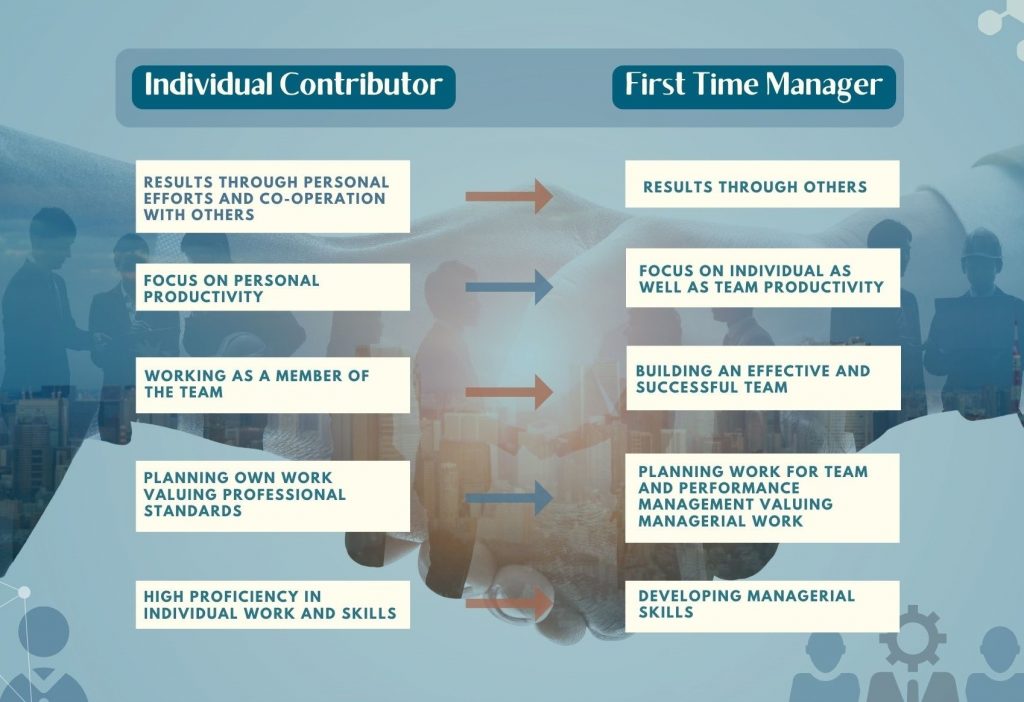By Sumit Sahini
Updated on Fri, July 08, 2022
The Organisation’s role in successful transitions into FTM roles.

The business imperative for effective transition and assimilation of Individual Contributors into First Time Manager roles has been clearly established and acknowledged. Yet most organisations have not arrived at a formula that can be applied and replicated to leverage the gains of effective assimilation.
The criteria for promoting Individual Contributors to FTM roles is their performance as ICs. To be fair that is the only visible criteria that can be used. The challenge comes from the fact that while performance as an IC is a necessary it is not sufficient criteria for the next move.
What needs to be acknowledged is that the new FTMs must be equipped with additional areas of:
• Understanding the FTM role and
• Acquiring skills of managing and developing people,
• Achieving results through people and
• Managing multiple stakeholders,
The FTMs must understand that “what good looks like” for FTMs is significantly different from “what good looked like” as ICs.
Getting promoted to a managerial position is a significant and first milestone of an individual’s career. It is an endorsement that the person has been doing a good job and gives a person an opportunity to pursue exciting new responsibilities.
Despite all the good things that come with such a promotion, it is a big change that can bring with it challenges the new managers might not anticipate.
The numbers prove this.
• 50% of transitioning first time managers in organisations are rated as ineffective.
• 20% of first-time managers are doing a poor job, according to their subordinates.
• 26% of first-time managers felt they were not ready to lead others to begin with.
• Almost 60% said they never received any training when they transitioned into their first leadership role.
These statistics clearly suggest that struggles first-time managers face represent the norm, not an exception. Therefore, providing adequate support that enables these managers to transition smoothly to their new role is critical.
Based on our experience working with large number of organisations, across industries, we believe that the following four strategies can help the FTMs make this transition smoothly and efficiently:
1. Have a clear understanding of the role and create a transition plan: There is a stark difference between an Individual Contributor and an FTM. This transition requires making following five shifts
The first step of transitioning smoothly is that an FTM must engage with his/her manager, direct reports, and peers to gather inputs on their core responsibilities, their expectations, and the dynamics of the team’s culture.
Basis the inputs received, the FTM must then develop a clear & simple transition plan and share it with their supervisor/team. Creating a transition plan and regularly tracking it will help to identify critical support resources, anticipate potential roadblocks as well as measures to deal with them and drives commitment for action.
2. Develop a foundation of healthy relationships: Positive relationships are critical for establishing credibility as a leader. Hence, the FTM must focus on developing a 360-degree support network by:
– Partnering with the manager and learning from their experiences: Managers are great resource to be leveraged as coaches during the transition- they have already experienced this phase and therefore, can help anticipate the challenges that the FTM may encounter as well as the measures that need to be taken to overcome these challenges.
– Schedule one-on-one meetings with the team members: The team plays an important role in helping the FTM achieve the desired results. Conducting one-on-one meeting withs the team members is a powerful tool for an FTM as it helps to build rapport, identify strengths and development areas of each team member, and understand their needs/motivators. Additionally, conducting weekly/monthly team meetings can help in understanding & communicating expectations, collectively uncovering & working through issues and gathering inputs to make informed & forward-looking decisions.
3. Focus on enhancing personal effectiveness: First-time managers must learn to be leaders while still being productive employees. Therefore, they need to focus on continually enhancing their industry specific expertise, effectively prioritise new aspects of their role & manage time and efficiently utilise the available resources.
Additionally, they must leverage emotional intelligence to manage self and team- use it to enhance self-awareness, empathize with the team and understand how to regulate emotions of self and others, especially when the pressure mounts.
4. Manage team to achieve quick results through people: As is clear from above, success of an FTM depends on the performance of the entire team. In other words, if the team wins, the FTM wins. Some of the things that transitioning manager can do to achieve collective quick wins are:
– Provide leadership to achieve results: Establish themselves as a team leader and focus on working with the team to establish goals for successful team / organisation outcomes. Creating a plan, and the smooth execution of it through creative thinking and effective problem solving.
–Give constructive feedback and coach team members regularly: Effective transition managers must also continually focus on giving constructive feedback that helps team members grow into a better version of themselves, mentor, and coach team members on their career development, hold team members accountable for their actions, and effectively deal with employees who lack ability, knowledge, or experience
– Regularly communicate your team results: Recognising achievements is essential for continued energy, commitment, and focus. Therefore, FTMs must focus on generating some buzz about the results by communicating them on a regular basis and developing effective motivational techniques to energize the team.
In conclusion 3 simple steps taken by the organisation can ensure effective, product and quick transitions into FTM roles. Acknowledging that the support needs to be provided, creating a clear sustainable development process to provide the support and development, replicating it consistently with sharp focus on objective that need to be met.








